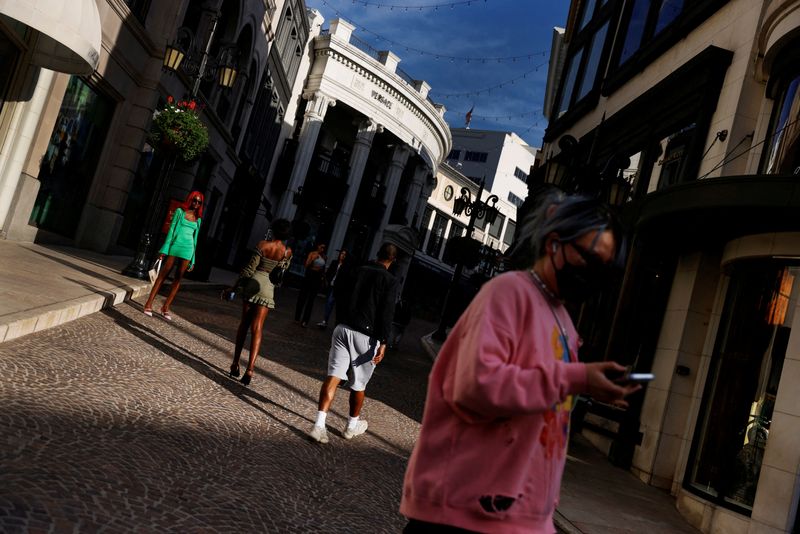By Mimosa Spencer
PARIS (Reuters) - Americans have cut back on buying luxury goods like designer clothing and accessories over the past two months, according to data from three credit-card companies, raising questions over the sector's resilience.
Citigroup (NYSE:C), Mastercard (NYSE:MA) and Bank of America (NYSE:BAC) data released this month showing lower U.S. spending just weeks ahead of the holiday shopping season could raise concern among investors that the industry's post-COVID-19 pandemic boom is at risk of petering out.
Luxury goods purchases by Americans last year boosted the fortunes of companies such as Chanel and LVMH.
Although luxury sales are still holding up well compared with cheaper brands, executives from some of the world's biggest luxury firms will be questioned about whether that trend will continue when they update on trading this week.
LVMH chief financial officer Jean Jacques Guiony said last week the company had so far not seen signs that shoppers were holding back, even for entry-level purchases.
Rivals Hermes and Gucci-owner Kering (EPA:PRTP) are set to report third quarter sales on Oct. 20 and Cartier-owner Richemont's first half report due on Nov. 11.
MIDDLE EARNERS CUT BACK
U.S. shoppers are paring back on their spending on high-end merchandise, according to the data. Separate estimates from the three credit-card companies show that Americans cut spending on luxury goods in August by 2% to 4%, and in September by 5% to 6%, versus a year earlier.
Spending cuts on luxury goods were sharpest among middle-income Americans with yearly incomes of $50,000 to $125,000, and those with yearly incomes of less than $50,000 a year, according to research by Bank of America, which analyzed debit and credit card purchases by roughly 16% of U.S. households.
In 2021, people with less than $50,000 in annual income represented 39% of U.S. spending on luxury goods, according to BofA, while those with incomes of $50,000 to $125,000 represented 34%.
"Aspirational" consumers, who tend to be younger and have less wealth than the luxury goods industry's traditional clientele, are usually the first to "feel the pain" and respond by decreasing spending, said Mario Ortelli of mergers-and-acquisitions advisory firm Ortelli & Co.
Ortelli said, in the United States, higher-priced brands like Hermes and Dior would likely be more insulated from a slowdown than accessible luxury brands like Michael Kors.
Brands including Yves Saint Laurent, Dior and Gucci have also expanded well beyond Rodeo Drive and Madison Avenue to aspirational shoppers.
According to Citi, both the number of U.S. individuals buying luxury goods, and the amount they spent, fell in September. Citi measured spending across 18 million accounts.
Mastercard's "SpendingPulse" report, meanwhile, measuring retail sales across payment types, showed luxury purchases, excluding jewelry, were down 5.2% in September, year-on-year, while spending on restaurants and air travel were on the rise.
PRICE HIKES
Major players, such as Louis Vuitton and Chanel have recently hiked prices. Chanel's quilted classic flap handbag cost $7,800 in July 2021, according to Internet reseller Bagaholic, and is now priced at $8,800.
"They might not be buying the bag again this year or next year," said Gregory Mancini, global co-head of equity research at Nuveen, noting that new luxury consumers who bought their first high end items with savings accumulated during lockdowns would likely return again, if later, for designer goods.

Further challenging labels on the lower end of the luxury scale is a shift toward higher-end goods.
According to Ortelli: "In a market like America where people buy a lot of stuff, people are becoming more discerning and buying less quantity but better quality."